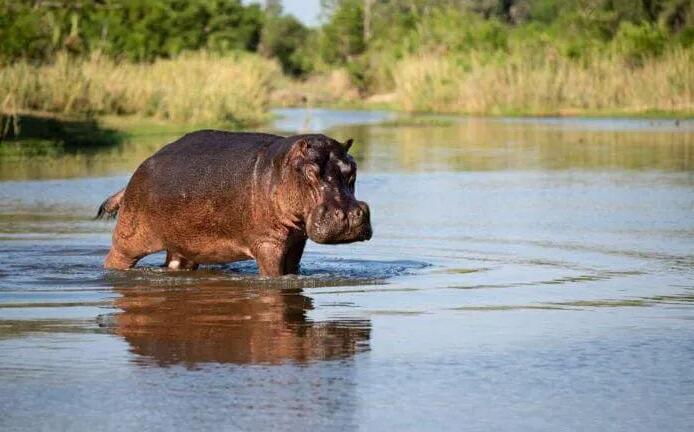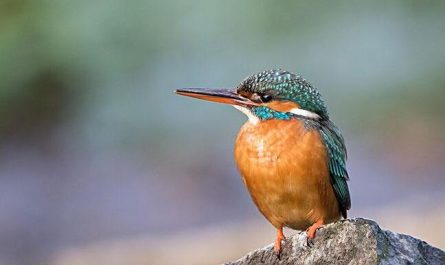The reason why hippos are always soaking in water
The hippopotamus is a mammal that lives in African lakes. If the hippopotamus does not stay in the water, the skin will become dry and cracked over time. Therefore, hippos always soak in the water during the day and breathe their heads out of the water. Hippos have thick subcutaneous fat and can float on the water without much effort. The hippopotamus is also very capable of diving. The hippo’s nostrils are in a straight line with the upper eyes and ears, so that it can smell, see, hear and breathe when its whole body is lurking in the water. When a hippopotamus encounters an enemy, it can sneak a few hundred meters away to hide. At night, the hippopotamus is cooler before going ashore to sleep or looking for food.
The hippopotamus has thick subcutaneous fat, and its ears and eyes can be closed automatically. Therefore, it can float on the surface and dive into the water effortlessly. If it is not soaked in water, the skin will become dry and cracked over time. Therefore, it is always soaked in water during the day, and at night it gets cooler before going ashore to sleep and find something to eat.
Life habits of hippos
Hippo is a kind of amphibian, likes to live in groups, good at swimming, afraid of cold, like warm climate. Their skin will be dry and cracked if they are out of water for a long time, and the foraging, mating, littering, and breastfeeding in life are also carried out in the water. Hippos are herbivores, but their sparse fangs are ten centimeters long. Female hippos are very aggressive in the field to protect small hippos. Hippos move in pairs or in small groups, and older males often move alone. Nocturnal: They sleep or rest in the river or near the river almost throughout the day, come out to eat at night, and sometimes swim more than 30 kilometers along the water for food. They mainly feed on aquatic plants; they occasionally eat land crops, mainly grass, and sometimes go to the fields to eat crops. When food is scarce, they also eat meat.
The hippo has a huge body, but it is very light to walk in the water. In the hot sun, muddy water on the body can protect it from the hot sun. The sweat glands of hippopotamus skin can secrete a red liquid as a natural sunscreen to moisturize the skin. It is often mistaken for excreted blood, called “blood sweat”. Because its skin is very sensitive, it will dry and crack if left in the water for a long time, so it spends most of the day in the water lazily, relying on the help of water to regulate body temperature and prevent dry skin, and sleep at night on the shore. Its eyesight is very poor and it can’t see things even above the water surface, but this does not affect its life, because underwater is often very turbid, and it is impossible to see far away.
Hippos like to live in groups. They are led by female animals. There are 20-30 animals in each group, sometimes as many as 100, especially in densely planted areas, with an average of one per 5.5 square meters. It has a special set of muscle tissue that can be used flexibly like a valve. It can close the ears and nostrils during diving. Each diving time can reach about 5-10 minutes, but it is not physiologically correct like aquatic mammals. The adaptability of water, living on land for a long time, can run at a speed of 20 kilometers per hour, so it can only be regarded as a semi-aquatic animal. Hippos usually submerge their whole body in the water, and only expose their ears, eyes and nostrils to the surface of the water, so that they can not only breathe normally, but also detect danger in time without being noticed by the enemy. In addition to being safe and cool, water can also help support its large and heavy body and make it walk freely in the water.
Although the hippopotamus always stays in the water, it can’t swim and can only dive. When frightened, usually avoid getting into the water. I spend most of my time in the water every day. When lurking underwater, I usually take my head out of the water to breathe once every 3 or 5 minutes, but I can lie in the water for about half an hour without coming out of the water for breathing. Hippos are usually quiet. Once they get angry, they often fight. They each use their sharp teeth to stab each other’s thick skin. Sometimes it got angry in the river, and it dared to overturn the boat and bite the boat into two pieces.
How hippos reproduce
Hippos mate in water and there is no fixed breeding season. The gestation period of females is 210-255 days. They give birth in water and give birth to 1 litter per litter. Newborn cubs weigh 40-50 kg and can walk and swim 5 minutes after birth. The hippopotamus mother with a baby has a very ferocious temperament. After the baby beast is born, the female beast takes care of it carefully, breastfeeds in the water, and only allows them to move within the visible range, and patiently teaches them to swim and roll. Protect them from harm. For the next few months, the female animal often took her cubs to live away from the group, because the cubs may be killed by the ferocious males or attacked by crocodiles. After 4-6 months, the cubs will be able to eat grass. The lactation period is about 1 year. The raising period of the offspring that a female usually bears alone can be extended to 18 months. Females mature between 7-9 years old, males are between 9-11 years old, and their life span is about 30-40 years.
Female hippos usually live alone with a baby hippopotamus for two months, quietly enjoying the family happiness. The mother and son often lie down and rest quietly, with the little hippo snuggling close to the mother’s mouth. Sometimes, the mother wants to take it into the water again, because the hippopotamus can’t get rid of the problem of how to stabilize its body temperature. After staying on the bank for a long time, it has to go into the water to cool down. At this time, the baby hippopotamus will skilfully climb onto the mother’s back or neck into the water . The baby hippopotamus still needs to feed constantly. The female hippo lies on her back and stretches out one hind leg, and her breast is exposed. When the little river is feeding, the female hippo will use the other hind leg to support her breast. Massage on the ground to stimulate milk. Mosquitoes will fly from time to time. These guys like the stray milk and sometimes rest around the nipple. So the female hippo slaps the river with her big mouth to scare away the mosquitoes flying around. The baby hippo can go ashore by herself, and the female hippopotamus no longer spoils it and lets it dive by herself. The baby hippo will inevitably fall when climbing ashore. The female hippopotamus uses her mouth to support her and encourage her to get up. The female hippopotamus also does not condone the naughty game of the baby hippopotamus, and will block it with a huge body, or simply use her big mouth to “learn” it.
The population status of hippos
The word “Hippopotamus” means “horse in the river”, which is what the Greeks called this powerful beast. The ancient Egyptians’ guess was more correct, they called it “the pig in the river.” Historically, hippos have lived in almost all rivers and lakes in Africa. From the hieroglyphs decorating the ancient Egyptian monuments, it can be concluded that there were many hippos living in the Nile River valley at that time, and hunting hippos was a popular pastime. The tusks of hippos are of great value, which is part of the reason why hippos are rapidly declining. Its distribution area continues to decrease, and nowadays, it can only be found south of 17°N latitude.
The main threats common to hippos are illegal and unrestricted hunting for meat and teeth, and habitat loss. Illegal hunting is considered to be the most serious war in the habitat area. During more than 8 years of civil strife and fighting in the Democratic Republic of the Congo, the local hippopotamus population has dropped by more than 95%. There are also reports of widespread poaching of meat from Burundi and Côte d’Ivoire. . For countries with a high percentage of common hippopotamus population reserves, the rate of reduction in the number of hippos is much slower, so habitat protection should be rewarded and illegal hunting should be punished.






